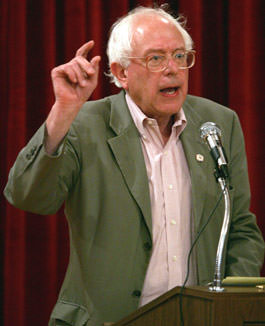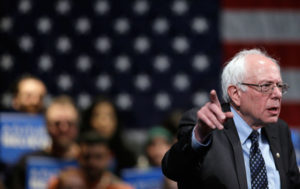Bernie Sanders’ Independent Revolution
In this March 2006 Truthdig Interview Bernie Sanders discusses his quest to become the junior senator from Vermont. Sanders, the U.S. House's sole Independent and only socialist, defeated his opponent Richard Tarrant in a landslide victory and is now Senator-elect.
: When Bernie Sanders won election as Vermont’s sole member of Congress in 1991, he became the House of Representative’s first Independent in 40 years. He’s now campaigning to become the junior senator from Vermont.
Through eight terms in office, the former mayor of Burlington, Vt., has struck a maverick, middle path between Democrats and Republicans, agitating most often for pocketbook issues of importance to middle- and lower-class Americans: protecting Social Security, expanding access to lower-cost prescription drugs, raising the minimum wage, and promoting trade policies that protect rural and manufacturing jobs.
The Nation magazine, which profiled Sanders last August, had this to say about the congressman’s ability to operate effectively across the political spectrum:
When the question of the moment is, What’s the matter with Kansas? it’s no surprise that Democrats want to know how Sanders wins tough races in an overwhelmingly rural state by drawing the enthusiastic support of precisely the sort of white working-class voters Democrats have had such a hard time hanging on to in recent months.
With polls consistently showing him to be far and away the most popular politician in Vermont, Sanders is currently seeking the Senate seat of the country’s other famous Independent, James Jeffords, who is stepping down from office next year. In this, however, Sanders may be in for his toughest fight yet; his GOP contender in the race, high-tech entrepreneur Rich Tarrant, is the state’s wealthiest person, and plans to pump upward of $10 million of his own money into the campaign — five times the most money ever spent on a Vermont race.
The congressman spoke with Truthdig’s managing editor, Blair Golson, about the current administration’s standing as “the most reactionary government in the modern history of the United States,” the failure of Russ Feingold’s movement to censure the president, and the progressive revolution he hopes to lead in American politics as the junior senator from Vermont.
Golson: What did you make of the president’s Cleveland speech on Iraq?
Sanders: Same old, same old. Clearly what’s going on in Iraq is a disaster; clearly the president has no plans on how to get our troops home. Just as he had no plan for waging war, just as he went to war under false premises. So his Iraq agenda is a disaster. My own view is that we need to bring our troops home as soon as possible. And by that I mean the majority in the next six months, and the rest within the next year. Polls indicate that the majority of Iraqis want our troops home, and we should respect their wishes.
In light of the president’s persistent unpopularity, should we expect increasing resistance to his policies in Congress?
What you are going to see is a more unified Democratic Party, and you’re beginning to see some modest dissent on the part of Republicans who, because of the president’s free fall in the polls, are more comfortable doing that. You already saw that on the Dubai Ports World, you’ll see it on budget issues, you may see it on the war, or environmental issues. There are virtually no moderate Republicans left in Congress — but the few that are there may choose to stand up on some issues and speak out.
Bush’s numbers have been in a free fall for several months now — since Katrina. Why haven’t we seen Congress playing a more aggressive role up until now — until his numbers have bottomed out to historic lows?
Well, I’m not the leader of the Democratic Party.
Sure, but my question wouldn’t only apply to Democrats.
The answer is that the Republican Party is a tightly controlled party in Congress, and they don’t tolerate dissent very easily. People lost their committee chairmanships, people don’t get access to campaign funds when they dissent. That’s been the history of the modern Republican Party in Washington. But we’ll see some Republicans, because of Bush’s free fall in popularity, show a little bit more courage.
In the wake of the WMD scandal and the botched rebuilding of Iraq, can we expect tougher questioning on Iraq?
Well, I’m actually co-sponsor of a resolution with Rep. John Conyers that calls for an investigation into why we went to war. There are huge questions to be asked about Iraq, and it’s not enough for the president to say simply that we got bad intelligence — and that that’s why we invaded Iraq. There are many people who don’t believe that. You’ve seen books by former CIA agents who disagree with that assertion. The American people have a right to know why we went to war, what the entire process was about. Not just to beat up on George Bush, but to make sure that the process doesn’t happen again.
Something that has not been widely publicized by the media is the complete abrogation of Congress’ constitutional responsibility to do oversight. Whether it is Iraq, and how we get into the war, whether it is the horrendous Medicare prescription drug bill, whether it’s Katrina, or a dozen other issues, Congress has chosen to play the role of rubber stamp, rather than asking hard, important questions that the American people wants answers to.
Why do you think the Congress decided to play the role of rubber stamp?
You have one-party government. Obviously right-wing Republicans control the House, they control the Senate, and they made the decision when Bush came in, that instead of operating as an independent branch of government they would act as a rubber stamp to make the president look good when they could, and to sweep under the rug any problems that the administration was having.
I am a member of the House Government Reform Committee, which is the oversight committee for the House, and what I can tell you is that when Clinton was president, there were hearings after hearings after hearing. Since Bush was president, [there have been hardly any].
It’s not a sexy issue, per se — but oversight, independent oversight, holding government agencies accountable, holding the White House accountable, no mater who is president, is one of the important responsibilities of Congress, and clearly, clearly, under Republican leadership they have not done that. And that has been a huge shortfall and insult to the American people — an abrogation of responsibility. Somebody has got to stand up and say, “Mr. President, we need an explanation. Department of Defense, we need an explanation.” And that’s what Congress’ job is. And under Republican leadership, that has not occurred.
Can you make sense of the fate of Sen. Russ Feingold’s censure resolution?
What the Democrats are now dealing with in the Senate and elsewhere is a very simple issue. On issue after issue, President Bush’s policies are widely unpopular — whether it is the economy, healthcare, civil liberties, environmental issues, oil prices, Katrina, war in Iraq, you name it. And what Democratic leaders are now trying to figure out is, given the free fall in President Bush’s popularity, the widespread contempt people have for the Republican leadership in Congress, what are the issues that they are going to focus on in the next eight months to win back the House and the Senate? And what they’re wrestling with is: Is the censure of the president the most effective way to go forward? And some of them don’t think so, because you have so many more issues that the American people feel so much more strongly about.
Why did the Patriot Act extension pass by such a wide margin?
I voted against the original Patriot Act and voted against the one that came up a few weeks ago. I think that fighting terrorism and protecting the American people is very serious stuff, but we can do it without undermining our constitutional rights.
There were actually more votes in the House against the re-authorization than I would have thought, but the reason it passed so strongly is that it became a political issue for Republicans — that anybody who voted against it is soft on terrorism. The truth is that we can effectively defend our country against terrorist acts without undermining constitutional rights. That’s why I voted against the original USA Patriot Act, and that’s why I’ve led the effort against various [subsequent] provisions of the act.
What are some of the things you hope to accomplish as senator?
My hope is in some way to fill the large shoes of the late Paul Wellstone. Paul was a good friend of mine, and was the only member of the U.S. Senate to be part of the Progressive Caucus, which I helped found in 1991. One of the most important issues that we have to deal with is the huge void that exists between what’s going on in Washington and people back home. And how you connect the grass roots of progressive America to the United States Congress, and keep them appraised of what’s going on, listen to what they have to say, support what they have to say, get support for important legislation, in other words, to create a political revolution, if you like, and a revitalization of American democracy. Getting people active in the political process and fighting for a progressive agenda would be the most important goals I have.
When we talk about a progressive agenda, I’m talking about a national healthcare program that guarantees healthcare to all people; we are talking about fundamental changes in our economic trade policy — doing away with our disastrous trade agreements that have cost us millions of decent-paying jobs; doing away with Bush’s huge tax breaks for the wealthiest people in this country; protecting Social Security and expanding our safety net so that the elderly and low-income people can live with dignity; protecting our civil liberties, protecting our right to dissent; also addressing the very serious problem that I have spent a decent amount of time on in Congress, which is corporate control over the media — how we create a media which informs people in a way consistent with a vibrant democracy, and we certainly don’t have that right now.
Why is it still important to you to keep your “Independent” moniker if you lean so heavily towards Democratic policies?
I have disagreements with the Democrats, and I’m proud to be Independent. I’m not a Democrat. And just because I agree with the Democrats more than I agree with the Republicans does not cease to make me an Independent, or somebody who has a very different viewpoint than the Democrats hold. In Congress you have two parties you can work with. And there’s no question in my mind that I have and always will work much more closely with the Democrats and support the Democratic leadership.
What kind of race do you anticipate against your opponent?
We are running against a guy who is the wealthiest person in the state of Vermont, who will spend five times more money on his campaign as has ever been spent on any campaign in Vermont history. In fact he will probably spend more money per voter than any candidate in U.S. Senate history. He’s been on TV for five or six weeks and will probably remain on until election day. When you’re up against that kind of money, it’s a serious race. We think we’re going to win, because we’re in the process of putting together the strongest grass- roots effort that the state of Vermont has ever seen. And our hope is to knock on virtually every door within the state and talk to people about the important issues in their life.
What’s the future for Independents? Between you and retiring Sen. Jim Jeffords, are you unique to Vermont?
The important issue for today is for people to understand that we’re dealing with the most reactionary government in the modern history of the United States, and it’s absolutely imperative to replace the Republican leadership in the House and the Senate and simultaneously it’s vitally important that we organize from one end of the country to the other a strong grass-roots movement which fights for progressive change in our country, and which takes power away not only from Republicans but from the big- money interests who dominate our economy, our political life and the media. Those are the goals I have, and that’s what I think the times call for.
Independent journalism is under threat and overshadowed by heavily funded mainstream media.
You can help level the playing field. Become a member.
Your tax-deductible contribution keeps us digging beneath the headlines to give you thought-provoking, investigative reporting and analysis that unearths what's really happening- without compromise.
Give today to support our courageous, independent journalists.






You need to be a supporter to comment.
There are currently no responses to this article.
Be the first to respond.